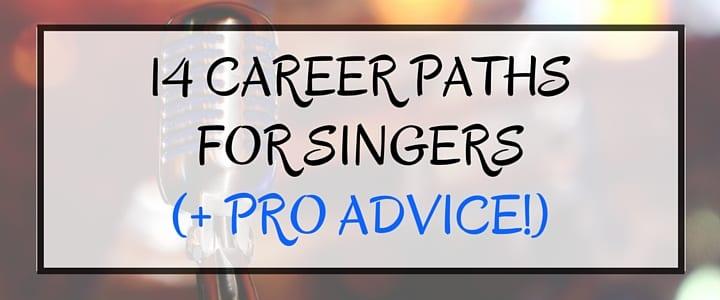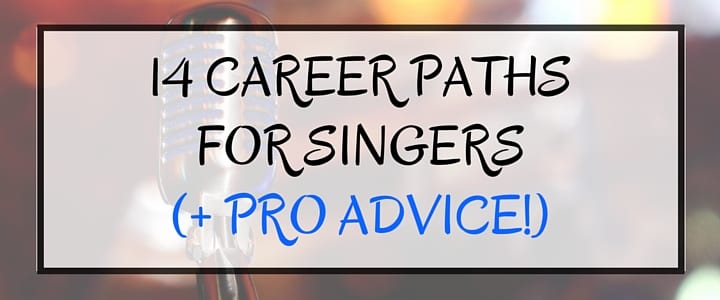Want to do what you love for a career? As an aspiring singer, you have several paths you can take — including full-time gigs and side jobs to ensure music stays a part of your life. In this career guide, voice teacher Liz T. shares how much a singer can make, and the many tips she used along her own journey to become a professional singer…
Many people dream of becoming a professional singer but are unaware of the certain steps and criteria that will help them achieve success. It takes a lot more than natural talent — if you want to become a famous singer, especially, you’ll need the right attitude and a strong business sense to make it in the music industry.
Read on as I answer the common questions my voice students ask when it comes to how to become a professional singer and what to expect.
1) What kind of training does a professional singer need?
Sure, some singers are discovered seemingly out of the blue, based on raw talent and without having much training — but that’s not the route I would advise taking. Think of it the same as any other profession; if you want to be a doctor or a nurse, you must practice in that field before you can get anywhere in your career. Similarly, if you want to be taken seriously as a singer, then you must invest time and money to study your craft properly.
Training from an Early Age
If you started taking voice lessons at a young age, you’re at a huge advantage in your training! Personally, I started taking music and acting lessons at the age of five, and I was also in my first live musical theater performance then. Doing that helped me internalize the proper techniques and hone my talents, as well as get used to being in the spotlight.
So my first piece of advice: commit to those weekly music lessons! No matter what age you start, a private voice coach will teach you valuable techniques that are sometimes difficult to learn on your own. Find a teacher who you trust and enjoy working with, and make sure he or she understands your goals.
Continuing Your Training
If you’re in high school and are thinking seriously about becoming a professional singer, it’s time to start thinking about college music programs. Whether you’re interested in pursuing classical/opera, musical theater, jazz, or contemporary rock/pop, there are many music colleges to look into. Some of the best music schools for singers include Berklee College of Music/Boston Conservatory, Juilliard, The New School, Oberlin, and University of the Arts.
While going to music school requires time and money, it will benefit you greatly. You’re investing in your future, and you’ll have the opportunity to meet other singers, professors, and performers that can help you throughout your career.
You’ll also be able to explore other styles of music and become a more well-rounded singer. I went to the Berklee College of Music for my Bachelor’s in Voice Performance and am now working on my Master of Music in Voice Performance there as well, and it’s something I will never regret!
2) What does it take to have a career in singing?
As I think about my advice for how to become a singer, two things come to mind. First, you need to be prepared to work hard. You’ll always be working at your craft — even famous singers continue to take lessons! In addition to performing regularly, you’ll also want to continue networking with other musicians and attending others’ performances to stay in the game.
Second, you need to have thick skin! Your music will be out in the public eye, whether it’s at a performance, in an audition, on your website, or streaming on Spotify or YouTube. Even great singers face criticism, so you need to learn to handle rejection and not be so hard on yourself. You’ll hear the word “no” at auditions more often than yes; if singing is your passion, it’s your job to pick yourself back up, listen to the feedback you received, and continue working hard.
3) What are the pros and cons to becoming a professional singer?
There are many advantages and disadvantages to having a career in the music industry. It’s not for everyone, but often the benefits make up for the struggles. Here’s what I’ve learned over the years.
Pros:
- Rewarding career
Being a singer is an extremely rewarding career overall! You have the opportunity to share your talents and love for music in front of many people. Music is healing, and it’s something that we all enjoy in both good and tough times together!
- Network of friends
Throughout your schooling and performances, you’ll find an incredible network of people! I’ve met some of my best friends this way. And since this business is all about “who you know,” establishing this network is also key to your success.
- Cool jobs and travel
As a professional singer myself, I’ve been fortunate to travel to almost 10 different countries to perform. I’ve worked as a performer on cruise ships and at theme parks around the world.
I’ve also performed at small intimate jazz clubs, big venues like Carnegie Hall, and even at events like the Macy’s Thanksgiving Day Parade! I’ve performed in front of Presidents and Popes, and if it weren’t for singing, I probably wouldn’t have had these experiences.
Cons
- Instability
Singing careers certainly have ups and downs, and it’s a very tough path to pursue. There aren’t many “safe” jobs for singers that come with steady benefits, income, or hours. Most jobs are seasonal, only lasting for the summer or for that tour, and they may not even be full-time.
Sometimes you may be offered 10 gigs in a row, and sometimes you may go a few months to a few years without getting a single offer. This is standard in the industry. Furthermore, the gigs you’re offered may not always pay much — and if you’re busy with rehearsals, you may not have the time to work a second job. If you want to be a singer, you have to be able to juggle your finances and be comfortable with instability.
- Physical demand
Performing as a professional singer in a major production may mean anywhere from seven to 10 shows a week. This is physically and mentally exhausting on the brain and body, so you must be healthy and in top-notch shape all the time! Also, while touring may be fun, being away from family and friends can be lonely, and traveling long distances can be tiring.
- Cost
Let’s face it: pursuing higher education is costly, no matter what you study. As a singer, you’ll also need to factor in your voice lessons and the costs of auditions (applications and possible travel).
If you want to get signed, you may also have to pay upfront. Nowadays, most singers that get noticed from A&R Executives have already spent anywhere from $5,000-$50,000 to create their demo or EP. Recording costs, copyrighting songs, and hiring other musicians and engineers is costly, and many singers have to save up for this or take out loans.
Also, many of the singers you see that have become famous from their YouTube or Facebook account or website did not do this without investing any money. They may have paid an extraordinary amount in hiring people and the space to film their music video, a photographer to take photos, and a manager to run their social media and web marketing.
Pro and Con:
- Settling down in a major city
This can be seen as a pro or a con! If you want to be a professional singer, you must be where the action is. Some of the big cities for music are New York, Los Angeles, Nashville, Las Vegas, London, and Paris. While some singers are able to avoid these big cities, it’s something to consider if you want to get seen and heard by industry professionals. The only problem? You’ll be competing with thousands of other aspiring singers who move there.
4) How much does a singer make?
We’ve all heard the “struggling artist” jokes — so if you’re seriously considering a career in music, you might be wondering, “How much does a singer make, exactly?”
The average singer’s salary depends on many different factors. First, what types of gigs are you performing at? As a singer who performs standards in restaurants and clubs, or as part of a wedding band playing covers, you can expect to earn anywhere from $40-$300 a night — but you may not be working every night. If you’ve worked your way up the ladder and are an in-demand performer, you could land a steady gig (and paycheck), earning anywhere from $40,000 to $100,000 a year.
Joining your local musicians’ union (such as the American Federation of Musicians or the American Guild of Musical Artists) can help you earn better income and benefits while performing. If you or the show you’re performing in is a member of the union, you’ll also receive health benefits. You will, however, need to factor in monthly or quarterly dues to be a member.
Other factors that can affect how much you make as a singer include your overall level of talent and the type of company you’re working with. Luckily, you’ve got a lot of options! While the financial struggles of being a singer may be discouraging, don’t let it bring you down. There are many ways you can get creative with your income as a singer. I encourage you to put your good voice to use and find them!
Scroll down to the end of this guide to check out the average salaries of professional singers.
5) How much does a backup singer make? How about other singing career paths?
If you don’t want to be right in the spotlight, you’ve got options! Backup singers can make a decent salary, but keep in mind you may not land the gig with Beyonce right away. Other career paths include being a session singer, working as a songwriter, hosting karaoke, or even teaching voice lessons to others. Again, check out the infographic at the end of this guide to learn more!
To conclude…
If you’re still reading this article, I applaud you for your patience and determination! To be a professional singer, you must be strong-willed, determined, and in touch with your emotions. I hope this article has given you much to think about on your journey! And if you’d ever like to learn more about my career as a professional singer, or if you want to schedule a voice lesson with me, please send me a message through my TakeLessons profile!
 Post Author: Liz T.
Post Author: Liz T.Liz T. teaches singing, acting, and music lessons online. She is a graduate of the Berklee College of Music with a B.M in Vocal performance and currently performs/teaches all styles of music including Musical Theater, Classical, Jazz, Rock, Pop, R&B, and Country. Learn more about Liz here!
Suzy S.



